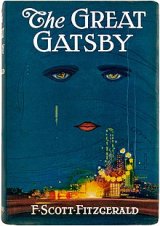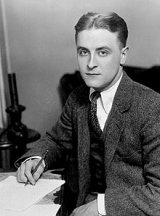The Great Gatsby Page #17
The Great Gatsby is a 1925 novel by American writer F. Scott Fitzgerald. Set in the Jazz Age on Long Island, near New York City, the novel depicts first-person narrator Nick Carraway's interactions with mysterious millionaire Jay Gatsby and Gatsby's obsession to reunite with his former lover, Daisy Buchanan. The novel was inspired by a youthful romance Fitzgerald had with socialite Ginevra King, and the riotous parties he attended on Long Island's North Shore in 1922
Cross to make bandages. I was. Well, then, would I tell them that she couldn’t come that day? The officer looked at Daisy while she was speaking, in a way that every young girl wants to be looked at sometime, and because it seemed romantic to me I have remembered the incident ever since. His name was Jay Gatsby, and I didn’t lay eyes on him again for over four years—even after I’d met him on Long Island I didn’t realize it was the same man. That was nineteen-seventeen. By the next year I had a few beaux myself, and I began to play in tournaments, so I didn’t see Daisy very often. She went with a slightly older crowd—when she went with anyone at all. Wild rumours were circulating about her—how her mother had found her packing her bag one winter night to go to New York and say goodbye to a soldier who was going overseas. She was effectually prevented, but she wasn’t on speaking terms with her family for several weeks. After that she didn’t play around with the soldiers any more, but only with a few flat-footed, shortsighted young men in town, who couldn’t get into the army at all. By the next autumn she was gay again, gay as ever. She had a début after the armistice, and in February she was presumably engaged to a man from New Orleans. In June she married Tom Buchanan of Chicago, with more pomp and circumstance than Louisville ever knew before. He came down with a hundred people in four private cars, and hired a whole floor of the Muhlbach Hotel, and the day before the wedding he gave her a string of pearls valued at three hundred and fifty thousand dollars. I was a bridesmaid. I came into her room half an hour before the bridal dinner, and found her lying on her bed as lovely as the June night in her flowered dress—and as drunk as a monkey. She had a bottle of Sauterne in one hand and a letter in the other. “ ’Gratulate me,” she muttered. “Never had a drink before, but oh how I do enjoy it.” “What’s the matter, Daisy?” I was scared, I can tell you; I’d never seen a girl like that before. “Here, dearies.” She groped around in a wastebasket she had with her on the bed and pulled out the string of pearls. “Take ’em downstairs and give ’em back to whoever they belong to. Tell ’em all Daisy’s change’ her mine. Say: ‘Daisy’s change’ her mine!’ ” She began to cry—she cried and cried. I rushed out and found her mother’s maid, and we locked the door and got her into a cold bath. She wouldn’t let go of the letter. She took it into the tub with her and squeezed it up in a wet ball, and only let me leave it in the soap-dish when she saw that it was coming to pieces like snow. But she didn’t say another word. We gave her spirits of ammonia and put ice on her forehead and hooked her back into her dress, and half an hour later, when we walked out of the room, the pearls were around her neck and the incident was over. Next day at five o’clock she married Tom Buchanan without so much as a shiver, and started off on a three months’ trip to the South Seas. I saw them in Santa Barbara when they came back, and I thought I’d never seen a girl so mad about her husband. If he left the room for a minute she’d look around uneasily, and say: “Where’s Tom gone?” and wear the most abstracted expression until she saw him coming in the door. She used to sit on the sand with his head in her lap by the hour, rubbing her fingers over his eyes and looking at him with unfathomable delight. It was touching to see them together—it made you laugh in a hushed, fascinated way. That was in August. A week after I left Santa Barbara Tom ran into a wagon on the Ventura road one night, and ripped a front wheel off his car. The girl who was with him got into the papers, too, because her arm was broken—she was one of the chambermaids in the Santa Barbara Hotel. The next April Daisy had her little girl, and they went to France for a year. I saw them one spring in Cannes, and later in Deauville, and then they came back to Chicago to settle down. Daisy was popular in Chicago, as you know. They moved with a fast crowd, all of them young and rich and wild, but she came out with an absolutely perfect reputation. Perhaps because she doesn’t drink. It’s a great advantage not to drink among hard-drinking people. You can hold your tongue and, moreover, you can time any little irregularity of your own so that everybody else is so blind that they don’t see or care. Perhaps Daisy never went in for amour at all—and yet there’s something in that voice of hers … Well, about six weeks ago, she heard the name Gatsby for the first time in years. It was when I asked you—do you remember?—if you knew Gatsby in West Egg. After you had gone home she came into my room and woke me up, and said: “What Gatsby?” and when I described him—I was half asleep—she said in the strangest voice that it must be the man she used to know. It wasn’t until then that I connected this Gatsby with the officer in her white car. ------------------------------------------------------------------------ When Jordan Baker had finished telling all this we had left the Plaza for half an hour and were driving in a victoria through Central Park. The sun had gone down behind the tall apartments of the movie stars in the West Fifties, and the clear voices of children, already gathered like crickets on the grass, rose through the hot twilight: “I’m the Sheik of Araby. Your love belongs to me. At night when you’re asleep Into your tent I’ll creep—” “It was a strange coincidence,” I said. “But it wasn’t a coincidence at all.” “Why not?” “Gatsby bought that house so that Daisy would be just across the bay.” Then it had not been merely the stars to which he had aspired on that June night. He came alive to me, delivered suddenly from the womb of his purposeless splendour. “He wants to know,” continued Jordan, “if you’ll invite Daisy to your house some afternoon and then let him come over.” The modesty of the demand shook me. He had waited five years and bought a mansion where he dispensed starlight to casual moths—so that he could “come over” some afternoon to a stranger’s garden. “Did I have to know all this before he could ask such a little thing?” “He’s afraid, he’s waited so long. He thought you might be offended. You see, he’s regular tough underneath it all.” Something worried me. “Why didn’t he ask you to arrange a meeting?” “He wants her to see his house,” she explained. “And your house is right next door.” “Oh!” “I think he half expected her to wander into one of his parties, some night,” went on Jordan, “but she never did. Then he began asking people casually if they knew her, and I was the first one he found. It was that night he sent for me at his dance, and you should have heard the elaborate way he worked up to it. Of course, I immediately suggested a luncheon in New York—and I thought he’d go mad: “ ‘I don’t want to do anything out of the way!’ he kept saying. ‘I want to see her right next door.’
Translation
Translate and read this book in other languages:
Select another language:
- - Select -
- 简体中文 (Chinese - Simplified)
- 繁體中文 (Chinese - Traditional)
- Español (Spanish)
- Esperanto (Esperanto)
- 日本語 (Japanese)
- Português (Portuguese)
- Deutsch (German)
- العربية (Arabic)
- Français (French)
- Русский (Russian)
- ಕನ್ನಡ (Kannada)
- 한국어 (Korean)
- עברית (Hebrew)
- Gaeilge (Irish)
- Українська (Ukrainian)
- اردو (Urdu)
- Magyar (Hungarian)
- मानक हिन्दी (Hindi)
- Indonesia (Indonesian)
- Italiano (Italian)
- தமிழ் (Tamil)
- Türkçe (Turkish)
- తెలుగు (Telugu)
- ภาษาไทย (Thai)
- Tiếng Việt (Vietnamese)
- Čeština (Czech)
- Polski (Polish)
- Bahasa Indonesia (Indonesian)
- Românește (Romanian)
- Nederlands (Dutch)
- Ελληνικά (Greek)
- Latinum (Latin)
- Svenska (Swedish)
- Dansk (Danish)
- Suomi (Finnish)
- فارسی (Persian)
- ייִדיש (Yiddish)
- հայերեն (Armenian)
- Norsk (Norwegian)
- English (English)
Citation
Use the citation below to add this book to your bibliography:
Style:MLAChicagoAPA
"The Great Gatsby Books." Literature.com. STANDS4 LLC, 2025. Web. 25 Feb. 2025. <https://www.literature.com/book/the_great_gatsby_1598>.








Discuss this The Great Gatsby book with the community:
Report Comment
We're doing our best to make sure our content is useful, accurate and safe.
If by any chance you spot an inappropriate comment while navigating through our website please use this form to let us know, and we'll take care of it shortly.
Attachment
You need to be logged in to favorite.
Log In